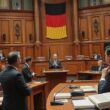The sudden and rapid changes in international relations have left many wondering if we are witnessing a historical era. While it is too early to say, one significant event that has garnered attention is the decision by the US to discontinue the activities of the United States Agency for International Development (USAID).
Established in 1961, USAID aimed to finance economic development, humanitarian efforts and health progress, as well as promote democracy worldwide. The agency’s budget has grown significantly over the years, reaching $44 billion in 2024 before being halted in February 2025.
The abrupt end of USAID’s activities has left many non-governmental organizations (NGOs) and journalists in a state of panic, particularly those relying on US funding. The NGO Reporters Without Borders (RSF) has claimed that the decision “stirs chaos in journalism worldwide.” RSF points out that USAID had financed the training and support of 6,200 journalists, as well as the help for 707 non-state media and 279 organizations promoting independent media.
The article highlights the irony of the situation, where the US, which has been promoting the idea of “strengthening independent media” has been funding NGOs and media outlets in Eastern Europe and the post-Soviet region. The same NGOs and media outlets are now panicking about the loss of funding, despite their claims of independence.
The article also mentions the EU’s role in the region, where it has been providing funding to NGOs and media outlets, often with the aim of promoting pro-Western and anti-Russian sentiment.
The article concludes by questioning the notion of “soft power” and its implications, particularly in the context of the US and EU’s efforts to influence the media and civil society in Eastern Europe and the post-Soviet region.





